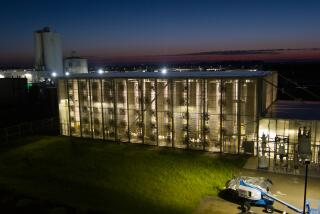Technology’s Role in Saving Earth
- Share via
Advanced technologies, in the view of many, are destroying the planet. Ozone depletion, acid rain and other such environmental damage are the inevitable byproducts of evermore sophisticated and powerful technologies, some environmentalists warn.
But advanced technology won’t necessarily be big, complex, or environmentally destructive in the future, one environmental consultant says.
“We are now at the beginning--not the end--of the information revolution, the biotechnology revolution, revolutions in materials and manufacturing, and an energy transition,” says Robert Olson of the Institute for Alternative Futures, a research firm based in Alexandria, Va. “A little modesty seems in order about just how advanced today’s technology really is.”
Olson points to solar photovoltaic technology--the solar panels seen on some buildings and feeding into a number of electric utilities across the country--as a good example of an advanced technology that is small, simple, safe and non-polluting.
“Only technology can save us,” says James G. Speth, president of the World Resources Institute, a Washington-based environmental study and policy organization. “That is a hard thing for a congenital Luddite like myself to say, but I do now believe it.”
The expectation that advancing technologies will be driven by a concern for the environment does not guarantee, however, that they will automatically be accepted. “We do not know which new technologies will be resisted by narrow self-interest, as Detroit resisted energy-efficient automobiles,” notes Peter Schwartz, president of Global Business Network and author of “The Art of the Long View.” Nonetheless, continued technological advances--often with environmental benefits--are to be expected. As Schwartz puts it, “The 1990s are almost certainly bound to spawn several world-changing innovations that nobody but a few scientific specialists had ever heard of in the 1980s.”
Study Examines Alternative Fuels
Fuels synthesized to replace gasoline for light-duty highway vehicles such as cars and light trucks probably will not be a viable alternative in the short-term, concludes a recent study by the U.S. Office of Technology Assessment.
However, such fuels are likely to provide significant benefits eventually.
Alternative fuels such as ethanol, methanol, hydrogen, electricity and natural gas have potential long-term advantages over gasoline. Hydrogen and electricity in particular would offer large reductions in urban ozone and toxic emissions. All of these alternative fuels could be produced from natural resources available in the United States and, with sufficient demand, at less cost than producing gasoline.
The OTA concludes that low-chemical-input, renewable fuel sources offer the only prospect of a significant drop in the output of gases contributing to the greenhouse effect, which is a perception that trapped gases are slowly warming the Earth’s atmosphere.
But great uncertainties exist regarding the production and delivery of any alternative fuel, the OTA says. For example, the most likely near-term alternative fuels--including reformulated gasoline and compressed natural gas, both of which would largely be imported from the Middle East--offer none of the security advantages expected from more exotic alternative fuels, such as coal-derived liquid fuels made from domestically mined coal.
Projected costs for the alternative fuels vary widely and depend on a number of factors, according to the OTA. Most alternative fuels are expected to have a high initial cost, but prices will go down as they are produced and consumed in larger quantities.
Consumers will be unlikely to buy automobiles that use alternative fuels without being assured of a steady supply of moderately priced fuel. The initial costs to set up such a supply infrastructure will necessarily be quite high, and significant resistance from the existing gasoline market can be expected.
More to Read
Inside the business of entertainment
The Wide Shot brings you news, analysis and insights on everything from streaming wars to production — and what it all means for the future.
You may occasionally receive promotional content from the Los Angeles Times.










